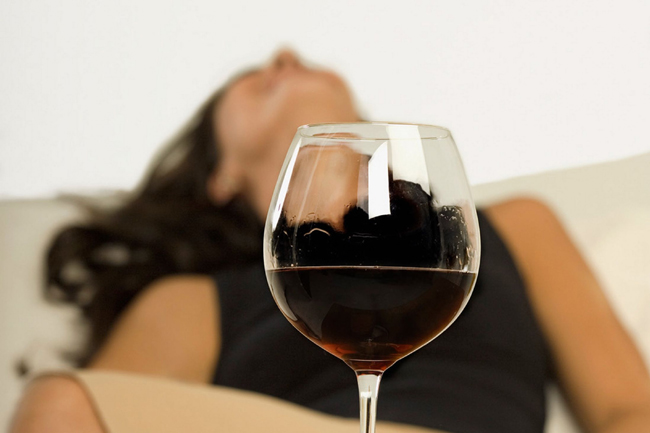Even a moderate amount of alcohol will put your health at risk. Find out what alcohol affects your body and health.
#Your Waistline
Weight gain is one of the most noticeable effects of regular high alcohol consumption. A glass of dry white wine contains 85 calories, and sweet wine 120 calories. A pint of beer has 170 calories, and stronger lagers contain up to 400 calories per pint.
Sticking to the recommended limit of 14 units a week, you can easily consume 6,720 calories per month if it consists entirely of sweet wine. That may equate to a weight gain of two or three pounds.
#Your Skin
Dilated capillaries, caused by blood rushing to the surface of the skin, is a common side-effect of heavy drinking. A woman’s complexion can also become more prone to spots, and her skin may develop dry patches.
#Your heart
When drinking exceeds the recommended guidelines, it starts to increase a person’s risk of heart disease.
A British study showed that women consuming 14 units or fewer of alcohol a week had reduced risk of cardiovascular disease, but those drinking more than 15 units were twice as likely to have hypertension or high blood pressure, which is believed to increase the risk of heart disease.
The study also found that alcohol raised unhealthy cholesterol levels in the blood.
The risk of a heart attack within ten years was lowest among those consuming seven units a week or fewer.
#Your Liver
Over time, the liver learns to break down alcohol at a faster rate, which is why it takes progressively more alcohol to get you drunk. But this process produces toxic chemicals that can attack the liver and cause cirrhosis.
Prolonged heavy drinking also upsets the delicate balance of enzymes in the liver and, eventually, fatty globules develop that cause the liver to swell.
#Your Pancreas
A painful inflammation of the pancreas, known as pancreatitis, can occur after just a few weeks of heavy drinking.
It results in a swollen abdominal area and can cause nausea and vomiting.
#Your Mental health
Alcohol suppresses the nervous system, which is why people lose their inhibitions and feel uplifted in the short-term. However, alcohol is actually a depressant and also shuts off the parts of the brain controlling judgment.
In the long-term, it can cause depression, anxiety and lethargy.
#Breast Cancer
A review of research published in the U.S. found that a high intake of alcohol is definitely associated with an increased risk of breast cancer in women.
Those found to be at most risk were women who drank, on average each day, either 2.3 to 4.5 bottles of beer, or 2.8 to 5.6 glasses of wine, or two to four shots.
#Nutrient Loss
Alcohol lacks essential vitamins and minerals, says Wendy Doyle, spokesperson for the British Dietetic Association. ‘Even Guinness and stouts, which people think contain a lot of iron, are very low in mineral content.’
As a result,people who drink heavily are at risk of nutritional deficiencies, especially from thiamin, vitamin B, calcium, magnesium and zinc.
Too much alcohol also attacks the liver, so it impairs its ability to store the fat-soluble vitamins A, D, E and K and to metabolise protein.
#Decision-making
Andrew McNeill, co-director of the Institute of Alcohol Studies, says women break down alcohol less efficiently than men and accumulate higher concentrations of it in the blood from drinking the same amount as men. This is because they have smaller livers and more body fat.
Even after a couple of drinks, the ability to make decisions and react quickly to events is impaired. With a few more, co-ordination gets worse and the secretion of hormones slows down, which results in clumsiness, slurred movements and an increased pain tolerance.
It takes the liver an hour to break down each unit of alcohol, so a night of overindulgence means enough alcohol may remain in the bloodstream to affect your ability to work the next day.
#Your Nails
The state of your nails is widely regarded as a sign of your general health. They require a steady supply of nutrients to grow healthily but, since they are not a vital organ, the body does not make them a priority when its vitamins and mineral levels are low.
Consequently, brittle, pale and peeling nails are often the first sign that your body contains too much alcohol.
#Fertility and Pregnancy
Women drinking up to five units of alcohol per week are twice as likely to conceive as those who drink ten units or more.
It is thought that too much alcohol interferes with the fertilised egg’s ability to implant in a woman’s womb.
Several studies have shown that babies born to women who drink while pregnant are more at risk of brain damage and learning disabilities.
This year, a study by American scientists showed that alcohol can cause millions of brain cells in the foetus to die.
These cells are responsible for connections needed for memory, learning and thought.
One drinking binge of four hours or more can be enough to cause damage.
Another risk is foetal alcohol syndrome, caused by overexposure to alcohol in the womb.
source: dailymail

